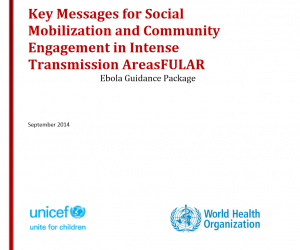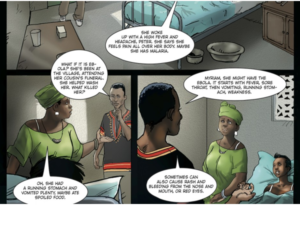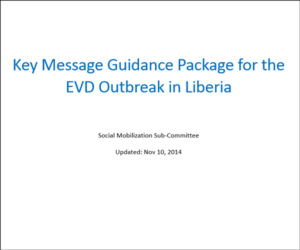WHO/UNICEF Key Messages for Social Mobilization (Fular)
 WHO/UNICEF Key Messages for Social Mobilization in Ebola Affected Countries translated in Fular by Translators without Borders.
WHO/UNICEF Key Messages for Social Mobilization in Ebola Affected Countries translated in Fular by Translators without Borders.
 WHO/UNICEF Key Messages for Social Mobilization in Ebola Affected Countries translated in Fular by Translators without Borders.
WHO/UNICEF Key Messages for Social Mobilization in Ebola Affected Countries translated in Fular by Translators without Borders.
 The first of a series of graphic stories about Ebola that covers prevention and seeking early care. This tool is used by IOM and county based partners to raise awareness and encourage positive responses within communities in Liberia. It . It was developed with the guidance of the Ministry of Health and Social Welfare, WHO and UNICEF.
The first of a series of graphic stories about Ebola that covers prevention and seeking early care. This tool is used by IOM and county based partners to raise awareness and encourage positive responses within communities in Liberia. It . It was developed with the guidance of the Ministry of Health and Social Welfare, WHO and UNICEF.
Download the full version here Comic Book: Ebola_ Spread the Message, Not the Virus
 This guidance package compiles current facts and key messages about the Ebola outbreak in Liberia to inform activities designed to raise awareness, mobilize communities, and promote safe behaviors to stop the spread of Ebola in Liberia.
This guidance package compiles current facts and key messages about the Ebola outbreak in Liberia to inform activities designed to raise awareness, mobilize communities, and promote safe behaviors to stop the spread of Ebola in Liberia.
The purpose of this guidance package is to provide government agencies, response committees and teams, media outlets, partners, and community leaders with accurate and consistent information to use for when communicating about Ebola in Liberia. All are encouraged to share this document widely as a guide for all communicating about Ebola.
The messages should be adapted to audiences and into Liberia’s local languages and vernaculars as they are shared through local community networks and organizations. Monitoring of audience response for effectiveness and needed refinement is encouraged.

The Ebola Communication Network was originally developed by the Health Communication Capacity Collaborative (Cooperative Agreement #AID-OAA-A-12-00058) and expanded under Breakthrough ACTION (Cooperative Agreement #AID-OAA-A-17-00017) both under the leadership of Johns Hopkins Center for Communication Programs. This website is now maintained by Johns Hopkins Center for Communication Programs and its contents are the sole responsibility of CCP. The contents of this website do not necessarily reflect the views of USAID, the United States Government, or Johns Hopkins University.
